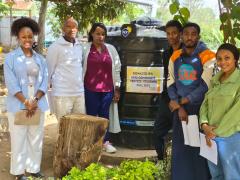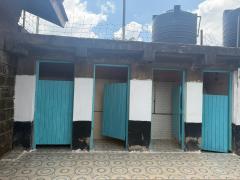Market And Value Chain Assessment For Refugee Livelihoods In Nairobi Metropolitan Area
By `Prof. Amos Njuguna, Stephen Njenga, Salome Asena, Kelly Matayian | Commissioned by UNHCR.
According to a report by UNHCR, the UN Refugee Agency as of May 2022, there were 552,061 refugees in Kenya, a majority of who do not access the labor market as they live in camps and experience obstacles in securing work permits. The report further shows that the number of refugees and asylum seekers preferring urban areas in Kenya is increasing, close to 84,000 refugees live in this area as it is perceived to have greater economic prospects and greater connectivity to domestic and regional hubs.
Additionally, in 2021, International Labor Organization (ILO) estimated the unemployment rate in Kenya to be 5.7 per cent, with the younger people being three times more likely to be unemployed. This aggravates the situation for refugees seeking economic opportunities in Kenya due to the limited opportunities available.
Although much has been done to remedy this situation through strategies and initiatives like the UNHCR Refugee Livelihoods and Economic Inclusion (2019-2023) Global Strategy that calls for advocacy to enhance an enabling environment such that refugees have a de facto access to decent work, can own businesses, access financial services, enjoy property ownership and exercise freedom of mobility among other things, as well as the enactment of the Refugee Act into law in 2021in Kenya that effectively granted refugees the right to gainful employment and business activity, awareness among the refugees and absence of frameworks for implementation remains a challenge.
With this in mind, USIU-Africa through the School of Graduate Studies, Research and Extension (SGSRE) in partnership with UNHCR and other organizations carried out a study to explore specific sub-sectors that have potential for profitability, growth and decent employment for refugees and asylum seekers in the Nairobi Metropolitan Zone, paying attention to relevance, potential for employment creation and feasibility for refugees and asylum seekers.
The study identified regulatory enforcement, awareness and implementation as the key challenges in enhancing refugees’ absorption into the employment sector in the country. Factors like lack of work permits, limitation in skills, lack of access to capital, and refugee status also contribute largely to refugee inaccessibility to formal work or self-employment.
Arguably, the study found out that the service, transport, construction and ICT sectors within the Nairobi Metropolitan Zone have the largest employment potential for refugees, where they can easily be absorbed and earn a living. However, this has to be supported by creating awareness of the Refugee Act 2021, proper implementation of frameworks that support employment of refugee and asylum seekers, enhancing acquisition of work permits by refugees, training and mentorship of refugees, providing seed capital for refugees to start their own business among other things.
The study used mixed research methods including document reviews, interviews with key informants and survey of refugees living in the Nairobi Metropolitan Zone. The study was done by Prof. Amos Njuguna (Dean, SGSRE), Stephen N Njenga (Country Director, Light for the World), Salome Asena (Senior Research Officer – GAME Center) and Kelly Matayian.
The study was funded by UNHCR and supported by various organizations including Light for the World, HIAS, JRS, Good Deeds, CBO, Humanity and Inclusion, International Rescue Committee (IRC Kenya), Micro Finance Institution - Longitude Finance, Monyqadow, Oak Solutions, Refugee Consortium of Kenya, Refugee-Led Organization Network of Kenya (RELON-KENYA), Refugees Led Organization, Refugee point, Umoja Refugee CBO/RLO and Youth Voices Community (YVC).
For more, download the complete report here.






